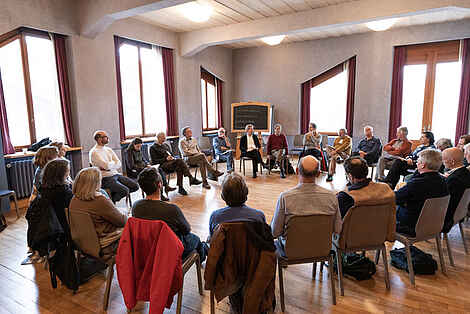What is the task of biodynamic farming today concerning price strategy? Two opposites are at odds with each other regarding this question: On the one hand, price transparency is essential to demand an accurate, honest price and stand up for it. On the other hand, there is the desire to do everything possible to ensure that what Demeter farmers achieve is rewarded, e.g. through CO² certificates.
Sekem plans to circulate CO² certificates for all small farmers in Egypt. In the current circumstances in Egypt, participation in the certificate scheme can mean up to one-third of the farmers' previous annual turnover. It means that Demeter products can be offered just as cheaply as conventional ones. This not only brings more financial stability to the farms but can also considerably boost climate protection as a whole.
In the EU, the picture looks different; one can get the impression that the fertiliser and pesticide industry is winning the battle for the most part, especially since such certificates are not possible in the long run. To do so, one would first have to make it possible to count the CO² quotas on the individual farms instead of integrating them as a lump sum into the German CO² balance. Last year, sales in the organic sector fell by about 20%. It is mainly due to the increased price sensitivity of customers, but one could also say due to the externalised costs of conventional cultivation. Nitrates in groundwater are still not allocated to the polluters but are borne by all citizens. It means there are no fair prices, and it hits the sector that can be considered the backbone of climate protection. The considerable decline in sales and rising costs have already led to the closure of many smaller specialist shops in the organic sector, affecting the entire sector.
Who has come through this crisis stronger so far?
Companies like ODIN (a company with 32 organic supermarkets in the Netherlands, founded in 1983), which succeeded years ago in integrating their customers into the company, e.g. by having them contribute to the financing of the company through membership models (monthly membership fees in exchange for reduced membership prices). This model significantly increases the customers' attachment to the shop; the regular inflow of funds means that part of the liquidity can be used to pre-finance agricultural production. ODIN currently has 15,000 members.
In these challenging times, NaturaSi in Italy could no longer provide partial pre-financing for harvests from its own liquidity. To still offer farmers this possibility, they asked their customers for help. Thanks to the small loans from the customers, who in return received a cheque card with a purchase credit, they were able to ensure liquidity.
Again and again, the question arises whether offering lower prices through such and other models is right. Don't we lose too much transparency if, for example, certain products are offered at discount prices to attract so-called price-sensitive customers?
The basic tenor of the Economy Council: We must be gentle in this transformation phase but must try to make reasonable offers for all customer groups and create transparent prices.
This mood of change was most noticeable in the Netherlands, where one of the largest farms with 6,000 ha has just converted to organic farming. The government has sent out clear signals that things cannot go on as they have been until now. It has also provoked several protests, but there is a sense in the country that the so-called tipping point is near. Many farmers already have plans to convert to organic or biodynamic farming in the drawer.
Communication remains a challenge: how can we convince customers that pesticide- and fertiliser-free food is more than sufficient in the long run - food security is thus guaranteed? It promotes more beautiful, more diverse landscapes and our carbon footprint is thereby significantly reduced.
The goal is a profound transformation so that organic and biodynamic food is no longer just niche products for a small market but affordable for all. How can we generate additional money to support this transformation and alleviate the plight of agriculture and farmers? It is essential to consider the individual situation in each country – solutions and methods must be adapted to the respective country. Different instruments are needed for this: Certificates, different prices for other groups of customers, strong links to the customers, political agencies and measurement systems such as the calculator of the Regionalwert Leistungen GmbH, which takes country-specific characteristics into account.
